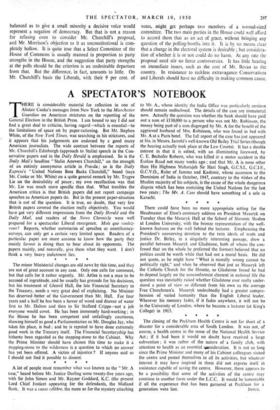A SPECTATOR'S NOTEBOOK
THERE is considerable material for reflection in one of Alistair Cooke's messages from New York to the Manchester Guardian on American strictures on the reporting of the General Election in the British Press. I am bound to say I did not find a great deal to criticise, having regard—which is essential—to the limitations of space set by paper-rationing. But Mr. Stephen White, of the New York Times, was searching in his strictures, and it appears that his judgements are endorsed by a good many American journalists. The wide contrast between the reports of Mr. Churchill's Edinburgh (approach to Stalin) speech in the Con- servative papers and in the Daily Herald is emphasised. So is the Daily Mail's headline " Stalin Answers Churchill," on the strength of an entirely anonymous article in Pravda ; so is the Daily Express's "United Nations Boss Backs Churchill," based (says Mr. Cooke or Mr. White) on a quite general remark by Mr. Trygve Lie on the desirability of peace ; my own recollection was that Mr. Lie was much more specific than that. What troubles the American critics is that British papers did not report campaign speeches as American papers do. But in the present paper-situation that is out of the question. It is true, no doubt, that very few British papers covered the election really objectively. You would have got very different impressions from the Daily Herald and the Daily Mail, and readers of the News Chronicle were well prepared for a spectacular Liberal resurgence. Mais que voulez- vous? Reports, whether summaries of speeches or constituency- surveys, can only get a certain very limited space. Readers of a particular paper are more anxious to know how the party they mainly favour is doing than to hear about its opponents. The papers mainly, and naturally, give them what they want. I don't think a very heavy indictment lies.
* * * *


































 Previous page
Previous page